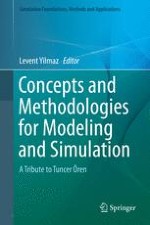2015 | OriginalPaper | Chapter
5. Learning Something Right from Models That Are Wrong: Epistemology of Simulation
Author : Andreas Tolk
Published in: Concepts and Methodologies for Modeling and Simulation
Publisher: Springer International Publishing
Activate our intelligent search to find suitable subject content or patents.
Select sections of text to find matching patents with Artificial Intelligence. powered by
Select sections of text to find additional relevant content using AI-assisted search. powered by
